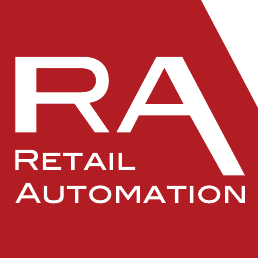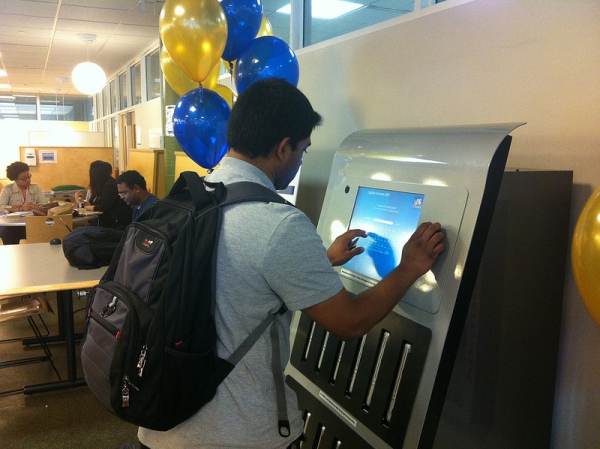Two a.m. might be prime study time for college students, but it's not always the most coveted shift for library employees. So some universities are testing a new way to give students the tools they need, like laptops or tablets, without adding to employees' hours: laptop lending kiosks.
The kiosks work like vending machines, or like the DVD lending dispensers at grocery stores. A student who wants to check out a laptop - or whatever device the university is offering - navigates a touch screen that authenticates the student's identity and then dispenses a charged machine. The laptop can be used for a certain number of hours, as determined by each university, and once it is returned its battery is charged while it waits for the next user.
About six universities are currently using the kiosks, which are provided by LaptopsAnytime, according to the company's vice president and co-founder, Jonathan Ruttenberg. Another half-dozen are in the process of implementing kiosks.
Drexel University is among the universities that recently installed a laptop vending machine. Danuta Nitecki, dean of Drexel Libraries, said the university had offered over-the-counter laptop borrowing for a while, but that service ended at 2 a.m., because there was no one to work the circulation desk. She and her staff had begun looking into the kiosks when a representative from the student government approached her to discuss the possibility of extending laptop borrowing, posing it as a safety concern, so students wouldn't have to walk to and from the library with their laptops late at night.
"It seemed to be a very nice opportunity to do something," Nitecki said.
LaptopsAnytime, which also works with public libraries, allows universities to choose which device or devices they want offered from the kiosk. Drexel went with MacBooks, because Nitecki said those seemed to be among the most requested laptops, but other universities use tablets and PCs, according to Ruttenberg.
Drexel also set a policy that allows a student to keep the MacBook for up to five hours, after which time they're charged $5 an hour. Such policies, along with the specifics of the verification process, user privileges, and e-mail notification system, can all be modified by individual universities, and LaptopsAnytime works with the library to determine the best lending procedures. In general, Ruttenberg said, it takes about three months from inquiry to installation of a kiosk, though he noted that sometimes the process can take up more than a year because of funding cycles.
The kiosk itself costs about $30,000, Nitecki said, based on the features Drexel selected. On top of that, the university had to pay for the 12 laptops it used to stock the machine.
One Checkout Per Hour
Drexel installed its kiosk in December with 12 laptops, and since the new semester started use has really picked up, Nitecki said. Through the first few weeks of the semester, the library saw 541 checkouts, averaging about one an hour. She notes that the library still offers over-the-counter laptop borrowing and has desktops available, but says some students just prefer to have a laptop available at 4 a.m., and the library wants to make that possible.
"There's quite a bit of technology out there," Nitecki said. "But the students like the laptops. It's mobile, you can find a good seat."
Though Nitecki wanted to wait a little while before judging the effectiveness of the kiosk - the novelty element had not yet worn off, she said - she was encouraged by early feedback. There have been some issues, she said, with slow authentication processes, but the library's tech team is working on it.
"We are definitely pleased with the results of this, and sort of amazed by the interest," Nitecki said.
If the positive feedback continues to roll in, Nitecki is interested in adding kiosks to other places on campus, like the health sciences library. Those kiosks could dispense a different tool, she said, like iPads or another kind of tablet.
Ruttenberg thinks technology kiosks could be useful in academic departments and student centers. He sees it as a matter of efficiency, and balancing a staffed program that requires employees to be on site with automated borrowing.
"Some public libraries do get rid of manual lending, but by no means do we push them in that direction," he said. "What we're doing is very complementary. Each institution has to figure out what's best for them."
Laptop kiosks can also help with space efficiency, Ruttenberg said.
"With desktops, clearly something people are dealing with is space," he said. "Libraries will say, 'We would really like to add a dozen computers, how do we do it?' And they very quickly go to laptops."
Nitecki said she didn't face much resistance in bringing the kiosks to Drexel, and Ruttenberg said typically universities' biggest concern is about changing the status quo. He encourages universities to think long-term.
"It's hard to come up with a cost justification in a very short-term mode, but when you start thinking three years out, five years out, or ten years out, all of a sudden things become very obvious," he said.
Read more: http://www.insidehighered.com/news/2013/02/08/libraries-turn-laptop-vending-machines-fulfill-students-late-night-studying-needs#ixzz2KWutVWGD
Inside Higher Ed




